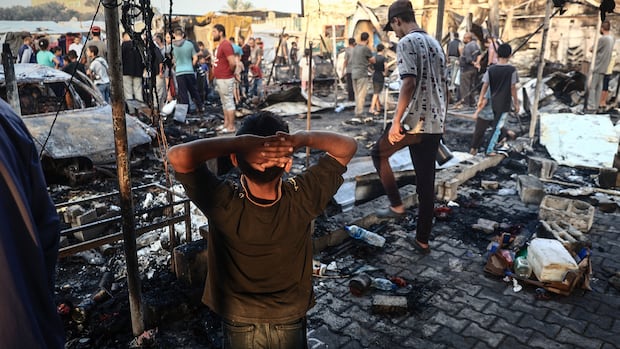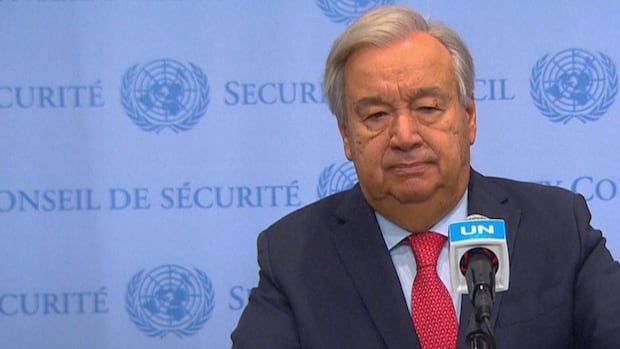
Palestinian health officials called on Wednesday for a humanitarian corridor to three hospitals in northern Gaza that have come close to collapse as Israeli troops have cut off the area during almost two weeks of heavy fighting against Hamas.
Doctors at the Kamal Adwan, Al-Awda and the Indonesian hospitals have refused to leave their patients despite evacuation orders issued by the Israeli military at the start of a major push into the Jabalia area of northern Gaza 12 days ago.
“We are calling on the international community, the Red Cross and the World Health Organization to play their humanitarian role by opening up a corridor towards our health-care system and allow the entry of fuel, medical, delegations, supplies and food,” said Hussam Abu Safiya, director of the Kamal Adwan Hospital.
“We are talking about more than 300 medical staff working at Kamal Adwan Hospital, and we can’t provide even a single meal for them to be able to offer medical services safely.”
Jabalia, home to one of Gaza’s eight historic refugee camps, was cleared early in the war by Israeli troops pushing through northern Gaza but Hamas fighters have re-established themselves in the area.
Dire humanitarian situation prompts worldwide concern
Palestinian health officials said the new Israeli offensive has killed around 350 Palestinians in Jabalia and nearby areas. In Gaza City on Wednesday, an Israeli airstrike on a house killed 13 people, medics said. In its daily update, Gaza’s health ministry said Israeli military strikes had killed 65 Palestinians across the enclave in the past 24 hours.
The dire humanitarian situation has prompted worldwide alarm, with the United States issuing one of its strongest warnings to Israel that it must improve the situation or face potential restrictions on military aid.
The Israeli military says it has killed more than 50 Palestinian fighters over the past days in airstrikes and close quarters combat as troops try to root out Hamas forces operating as guerrillas in the rubble.
It has told people to evacuate to what it said were safer areas in the south, fuelling fears among Palestinians that the drive is aimed at clearing them from northern Gaza permanently as part of a plan to control the enclave.
Israel has denied the evacuation orders are part of a systematic clearance plan, saying they have been issued to ensure people’s safety and separate them from militants.
How much aid reaching those in north unclear
The Israeli military denies restricting supplies, saying that since Oct 1, more than 9,000 tons of humanitarian aid such as food, water, gas, shelter equipment and medical supplies have entered Gaza through various crossings.
It said some of that aid was transferred directly into northern Gaza, where the United Nations estimates some 400,000 Palestinians remain.
However, how much of that has reached those in need in northern Gaza remains unclear.
“Nothing entered northern Gaza. People in northern Gaza are starving,” said Hadeel Obeid, a supervisor nurse at the Indonesian Hospital, where 28 patients were being treated.
“Our administrative manager provides just one meal for all persons including doctors, nurses, patients, and their companions. It’s a small amount, not enough for an adult person.”
Israel is facing renewed criticism after airstrikes in Gaza killed multiple civilians, including people at a UN-run school distributing polio vaccines. Meanwhile, there is anger in Lebanon after a deadly air attack in the north. Israel vowed to continue striking at Hezbollah throughout the country.
Medical supplies were running down due to the daily demands of caring for the wounded, she told Reuters via a messaging app.
Israel launched the offensive against Hamas after the militant group’s Oct. 7 attack on Israel, in which 1,200 people were killed and around 250 taken hostage to Gaza, according to Israeli tallies.
More than 42,000 Palestinians have been killed in the offensive so far, according to Gaza’s health authorities.
UNRWA nearing breaking point in Gaza
The UN Palestinian refugee agency is close to a possible breaking point for its operations in the Gaza Strip due to increasingly complicated conditions, its head said on Wednesday.
“I will not hide the fact that we might reach a point that we won’t be able anymore to operate,” UNRWA chief Philippe Lazzarini told journalists at a news conference in Berlin.
“We are very near to a possible breaking point. When will it be? I don’t know. But we are very near of that.”
He said the agency was facing a combination of a financial and political threats to its existence, in addition to difficulties in day-to-day operations, as aid is even more desperately needed against the threat of disease and famine.
UN Secretary General António Guterres says banning UNRWA would be ‘a catastrophe in what is already an unmitigated disaster.’ He’s written to Israeli Prime Minister Benjamin Netanyahu in an attempt to dissuade him from drafting legislation that would seek to block UNRWA operations in Israel.
He said there was a real risk, heading into winter, with people’s immune systems weakened, that famine or acute malnutrition could become a likelihood.
UNRWA provides education, health and aid to millions of Palestinians in Gaza, the West Bank, Jordan, Lebanon and Syria.
It has long had tense relations with Israel but ties have deteriorated sharply since the start of the war in Gaza.

